
 |
 |
|
| About Us | Essential Library | Read Past Issues | Resources | Composer Links |
Paulus is a prolific composer, having written over 200 works including more than 30 pieces for orchestra, dozens of choral works, works for solo voice, chamber ensembles and eight operas--the best-known of which so far is his 1982 The Postman Always Rings Twice, which was the first American opera to be produced at the Edinburgh Festival in Scotland in 1983. The outline of the Heloise and Abelard story is fairly well-documented. Born in 1079 in Brittany, Abelard was a brilliant theologian and dialectician who moved to Paris and was hired by Canon Fulbert as a tutor for his niece, the ever-so-adorable Heloise. As sometimes happens when biology and proximity come together they fell in love and began an intensely sexual affair. When Heloise became pregnant, Abelard removed her from her uncle's house to his family home to give birth to their son. They married in secret to protect Abelard's reputation, and though she returned to her uncle, they continued to meet in secret. When Fulbert grew increasingly angry, Abelard moved Heloise to a convent in Argenteuil, where he continued to visit her. Fulbert extracted--so to speak--his revenge by sending his henchmen to castrate Abelard. Paulus and his librettist Frank Corsaro derived much of the material for the opera from nine long letters the couple wrote to each other after Abelard's misadventure and they went their separate ways, each having taken religious vows. The opera commission
represents the first of a series of new works of music, drama and dance
that are being commissioned as part of the celebration of the school's
centennial in 2005. -JB
|
THE GOLDEN AGE OF OPERA? "In all of Canada, back in the 1930s, there wasn't a single permanent [opera] company regularly peddling Giacomo Puccini and Richard Wagner. And in the United States, the situation wasn't a great deal better. Today? Opera America... embraces 117 professional companies in 45 states and 19 more in five provinces, and those companies are not the only ones currently active." Toronto Star 04/20/02 ORCHESTRAS (FINALLY) DISCOVER THE INTERNET: It's been nearly a decade since online information became a crucial aspect of American life, which means it ought to be just about time for American orchestras (always the land tortoises of marketing in the arts world) to discover that they might be able to use the internet to their advantage. The Chicago Symphony Orchestra "retooled its Web site in August 2000, in part to boost its online ticket sales. Since then orchestra officials said the group quadrupled its online ticket sales... Other U.S. orchestras are reporting similar gains." Chicago Tribune 04/21/02 INTERESTED, BUT NOT THAT INTERESTED: A new study by the American Symphony Orchestra League finds that, while nearly a third of American adults profess to be "interested" in classical music enough to listen to it regularly, only 5% go to live concerts. The study does not say how many of the "interested" adults were doing their regular listening while standing in an elevator. Andante 04/21/02 BYE BYE DUTOIT: The Montreal Symphony has finally accepted Charles Dutoit's resignation from the orchestra and says it will begin a search for his successor. "The announcement came the day after the musicians voted on a resolution to invite Dutoit back. The results of that vote were not revealed and there was no indication that they would be. It was also unclear at the time of the vote whether the resolution would have any effect on Dutoit." Andante 04/18/02 TRAILBLAZER: Marin Alsop has probably accomplished more than any other female conductor. "How big a role I've played in [blazing a trail for other women] I'm not certain," Alsop says. "But I'm always very happy when young women [today] who are interested in the field think [being a woman is] a nonissue." Christian Science Monitor 04/19/02 MUSIC AS "DAY-PART": Why does classical music radio programming often sound so canned? How do they decide what music to play? It's certainly not like programming a concert. Instead, programmers are looking for a "sound" in an exercise known as "day-parting." Washington's WGMS has a "database containing descriptions of the music in the station's 10,000-CD library. Selections in the database are categorized according to a couple of dozen adjectives that the station has come up with to define each composition's 'mood and energy level'óamong them 'boisterous,' 'pleasant,' 'tranquil,' and 'lively'." The Atlantic 03/02 STUDY - DIGITAL HELPS NEW ARTISTS: It's tough to be a big pop star these days. But better if you're a newcomer. A new study of Billboard charts finds that "the number of artists who appeared each year on the charts increased by 31.5 percent from 1991 to 2000, suggesting that more new artists are hitting the charts, at the expense of established musical acts. The biggest change occurred from 1998 to 2000, when the number of fresh faces making the Billboard 200 increased 10 percent." San Francisco Chronicle (WP) 04/17/02 VONK TO QUIT ST. LOUIS: St. Louis Symphony music director Hans Vonk, who had to stop midway through a performance in February because of illness, is stepping down. "Vonk will remain with the organization but in a dramatically reduced role, Symphony management told the Post-Dispatch on Tuesday. He will conduct just two weeks a year for the remaining three years of his contract and may advise the organization on artistic matters." St. Louis Post-Dispatch 04/17/02 DUMB TIL YOU'RE NUMB: Why are fewer people listening to classical music on the radio? "The big problem is that music has been progressively dumbed down over the years, and not just at WNYC. Talk about music has replaced music itself, or the music is guitar sonatas and easy-listening favorites, background noise that drives away serious devotees. The public can judge quality. If you cheapen a product enough, eventually no one will want it. It is no surprise people have stopped tuning in." The New York Times 04/17/02 MUSIC
BY LAPTOP: "In a larger sense, nearly all of the music you hear
today, both recorded and live, is electronic. This doesn't necessarily
mean that it's digital - many studio engineers and artists remain fervently
attached to analog hardware, with its arguably greater warmth and richness.
But the computer is inextricably woven into all stages of the modern recording
process: Even acoustic music such as string quartets and bluegrass is spliced
and diced with all-purpose mixing software like Pro Tools and Logic. The
wandering tones of mediocre (but marketable) singers are routinely treated
with pitch-correcting programs like Antares Auto-Tune. And no one balks
at drum machines anymore." Wired 04/15/02
|
Actually, the strange looking tableau above is a prototype of the Parco Della Musica in Rome, the largest concert hall complex in Europe, which opened somewhat for business yesterday. (The largest hall won't be finished until December.) The $140 million project -- three separate theaters centered around an open-air arena designed by famed architect Renzo Piano -- will be used to showcase chamber music, opera, contemporary music, theater, ballet, and symphonic performances. "Until now, music in Rome lived one moment in a piazza, another in a church, another in a sports arena," Luciano Berio, Italy's foremost composer and the chairman of the new auditorium's board, said in an interview with the Rome daily La Repubblica. (Berio, as I'm sure many of you have guessed is the inspiration for the name of this web site.) The outdoor arena seats 3,000 and the three concert halls, seat 700, 1,273 and 2,756 people respectively. Overall, the complex covers 55,000 square meters (66,000 square yards), and officials said it had no rival in Europe. Yesterday's opening ceremonies included a full-day of concerts of different genres, from classical to pop and rock 'n roll, with performances by among others the weird but good British violinist Kennedy and the weird but good Patti Smith. Electronic Dialogue/14 An Interview with Gloria Coates
In 1986, Coates was one of the 10 finalists for the International Koussevitsky (KIRA) Award which honors a living composer for an important work for her composition "Music on Open Strings." She has been the recipient of numerous awards, commissions and distinctions. Coates' music has been performed by leading soloists, ensembles and orchestras such as the Bavarian Radio Symphony Orchestra, Brooklyn Philharmonic, Stuttgart Philharmonic, Milwaukee Symphony, Saint Paul Chamber Orchestra, the London Sinfonia, Polish Chamber Orchestra, various international chamber ensembles including Das Neue Werk Hamburg, the Dresden Ensemble for New Music and the Kronos Quartet. Her work Music on Open Strings, written in1973 for orchestra, was premiered at the Warsaw Autumn of 1978 and proved to be the most widely discussed work on the Festival. In 1979 she was commissioned to write a work for the East Berlin Festival, the first non-socialist composer ever to be performed on it. Some other Festivals include the Dresden Festival, New Music America - New York 1989, Musica Viva Munich, The New York Microtonal Festival, Henze's Festival Montepulciano, Passau International Festival, and the Dartington Festival in England. From 1969 to 1989, Coates lived in Europe where hers was a powerful voice on behalf of American music. She has lectured, written musicological articles, produced and broadcast radio programs, and organized a concert series of German-American music in Munich from 1975 - 1984. Since 1989 Gloria Coates has divided her time between the United States and Europe. In addition to her composition, she is a trained painter and the CD covers featured in this article are photos of her work. Coates'
canon of work includes compositions for orchestra (13 symphonies), chamber
(7 string quartets) and solo music, vocal (a song cycle on poems by Emily
Dickinson), choral music, live electronic and music for the theater. Her
string quartets 1, 5 and 6 have just been released on Naxos CD.
S21: You are best-known for your symphonies. How do you decide what constitutes a symphony? What elements must a work contain to be a symphony rather than, say, an Essay as Barber sometimes called his pieces)? Does your definition somehow relate to Mahler's idea that a symphony is a work that contains everything it takes to make a "world?"
Classical Grammy Winners |
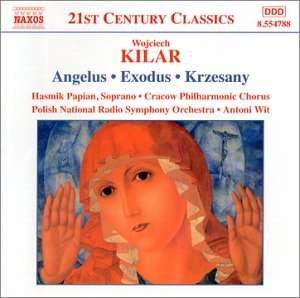
Angelus; Exodus; Krzesany Composer: Wojciech Kilar Conductor: Antoni Wit Performer: Hasmik Papian Naxos - #8554788 Not as well-known as his fellow Poles, Kilar is, nonetheless, extremely well-known in the world of film where he has written music for more than 100 movies. His music is strong, theatrical and filled with adenture. Nothing here is less than dramatic and much is downright unforgettable. |
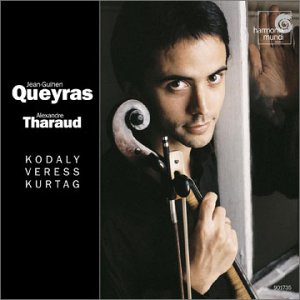
Cello Works Composer: Kodaly, Veress, Kurtag Performer(s): Jean-Guihen Queyras, Tharaud Harmonia Mundi Franc - #901735 Marvelous playing from young Queyras whose technique is so formidable that he makes Kodaly's torturous and melancholy Sonata for Solo Cello, Op.8 sound like fun, which may be the wrong idea, but is no less awesome for the performance. Highly recommended. |

Chanson D'Amour Composer: Amy Beach Performer: Emma Kirkby Ensemble: The Romantic Chamber Group of London Bis - #1245 Amy Beach's setting of Victor Hugo's L'aube naît, et ta porte est close! may have come after settings by Donizetti, Gounod, Lalo and Widor but hers is better than any of the boys.' |
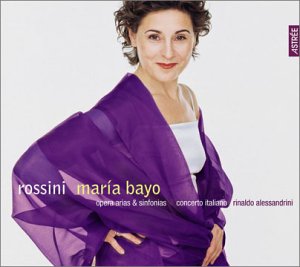
Opera Arias and Overture Composer: Gioachino Rossini Conductor: Rinaldo Alessandrini Performer: Maria Bayo Ensemble: Concerto Italiano Astree - #8853 |

Thomas and Beulah Composer: Rita Dove and Amnon Wolman Performer(s): Ursula Oppens & Cynthia Haymon Innova Records - #559 A theatrical song-cycle based on the Pulitzer Prize-winning collection of poems by Rita Dove, Thomas and Beulah, traces the lives of her grandparents. In live performance hanging scrims and theatrical lighting were used to separate and illuminate each audience section, providing a physical parallel to the music¹s changing points of view. This dramatic setting is recaptured on the multi-media portion of the disc. Wolman's perfectly-integrated music incorporates computer-generated sounds, often combined with acoustic instruments. |

Why is this night different?, Tuireadh, Visions of a November Spring Composer: James MacMillan Performer: Robert Plane Ensemble: Emperor String Quartet Bis - #1269 MacMillan's writing seems to inhabit two worlds: modern choral works that are often dissonant and suggest elements of Messiaen; yet they also reflect harmonies and plainsong-influenced melodic lines that are as old as the ages. You don't need to be a believer to appreciate the sounds of the spirits he brings to life.
|
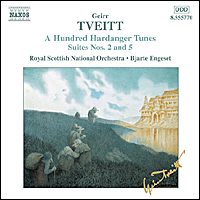
Hardanger Suites Nos.2 & 5 Composer: Geirr Tveitt Peformer: Royal Scottish National Orchestra Bjarte Engeset, conductor The latest offering from Naxos from the greatly underrated Norwegian genius Geirr Tveitt. Tveitt studied in Leipzig, Vienna and Paris with teachers including Honegger, Villa-Lobos and Wellesz, but his cosmopolitan style stemmed mainly from deep roots in his familyís native Hardanger region, whose folk tradition Tveitt made his own in these richly imaginative orchestral suites. "If a leaf grows on a birch tree," he said, "It has to be a birch leaf." |
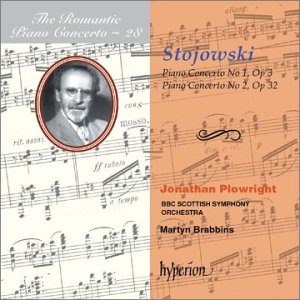
Piano Concertos 1 and 2 Composer: Stojowski BBC Scottish Sym OrchGeorge Hyperion - #67314 Yet another in Hyperion's endless series of romantic piano concertoes, these two glorious, high-spirited works are the product of the imagination of a Polish composer named Sigismond Stojowski who is today a completely forgotten name to all but the most dedicated piano aficionados. Like so many "discoveries" in this invaluable series, one wishes the programmers would give the Grieg and the Schuman a rest and play some of these gems for a change. |
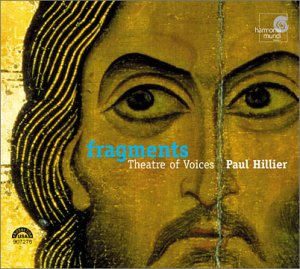
Fragments Performer(s): Theatre of Voices, Hillier Harmonia Mundi Franc - #907276 Not contemporary, of course, but strangely "modern" and invaluable for those who aren't quite sure where Arvo Part, John Tavener or James MacMillan are coming from. |
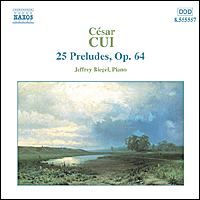
25 Preludes, Op. 64 Composer: César CUI Performer: Jeffrey Biegel Naxos - #8555557 |

Piano Sonatas Nos. 6 & 8 Composer: Sergei Prokofiev Performer: Francois-Frederic Guy Naive - #4898- François-Frédéric Guy sounds amazingly like a young Sviatoslav Richter as he powers his way through the climaxes of Prokofiev's demanding scores. Yet, he can also play quietly (as in the Sixth Sonata's Allegretto). One suspects we'll be hearing more about young Mr. Guy. |
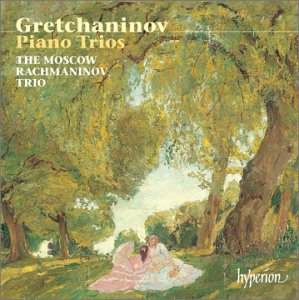
Piano Trios / Cello Sonata Composer: Leo Brouwer Performer: Elena Papandreou Naxos - Fans of late romantic chamber music will find much to enjoy here. Gretchaninov left Russia after the Revolution, settled in Paris, and eventually moved to New York, where he died in 1956 at the age of 91. His works are Russian, yet also reflect his French and American influences. The performances are excellent. |
|
One-Minute Web Guide The essential guide to intelligent life on the internet |
Publisher: Duane Harper Grant (212) 582-4153 Editor: Jerry Bowles (212) 582-3791 Contributing Editors: Armando Bayolo, Sam Bergman, Joshua Cohen, Karina Cristina Demitrio, Deborah Kravetz (C) Sequenza/21 LLC 2000 |